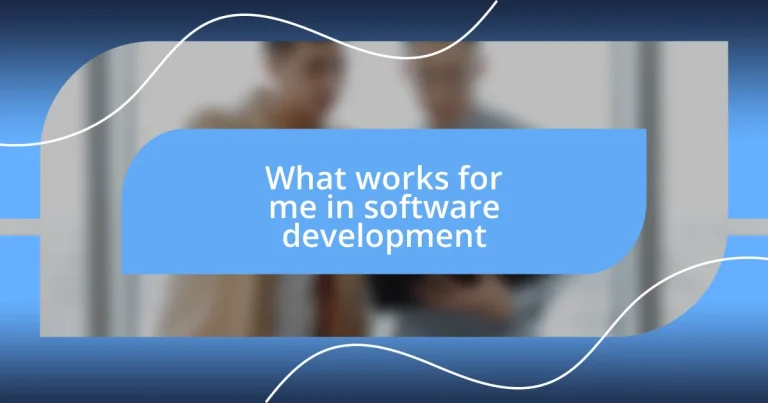Key takeaways:
- Adopting consistent coding practices and writing meaningful comments enhances code readability and maintainability.
- Participating in code reviews fosters collaboration, knowledge sharing, and ultimately leads to improved code quality.
- Leveraging development tools and continuous learning strategies significantly boosts productivity and empowers developers to adapt to challenges effectively.
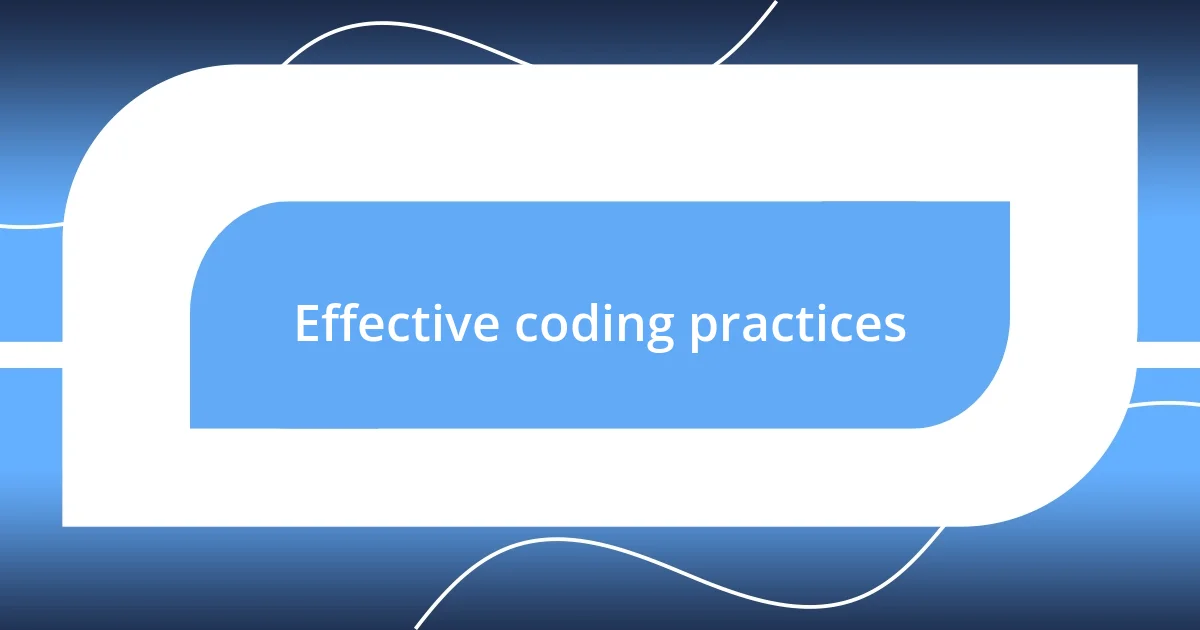
Effective coding practices
When it comes to effective coding practices, I’ve learned that consistency is key. I remember when I first started coding, my projects were a chaotic mix of styles. It wasn’t until I adopted a standard formatting style, like using indentation and consistent naming conventions, that my code became easier to read and maintain. Doesn’t it feel great when you can pick up a project after a week and immediately understand what you were doing?
Another practice that has significantly improved my coding is commenting—particularly, writing meaningful comments. Early in my career, I thought comments were unnecessary, but now I see them as a lifeline, especially when I revisit old code. I often ask myself, “Would the next developer (or future me) understand this at a glance?” I strive to answer that proactively by clarifying complex logic or decisions within my code.
Finally, I can’t stress enough the importance of regular code reviews. I vividly recall my first experience participating in one—it was eye-opening! I discovered fresh perspectives and best practices that I’d never considered. How all of that feedback could elevate the overall quality of the project! Now, I welcome code reviews as an invaluable learning opportunity, not just a critique.
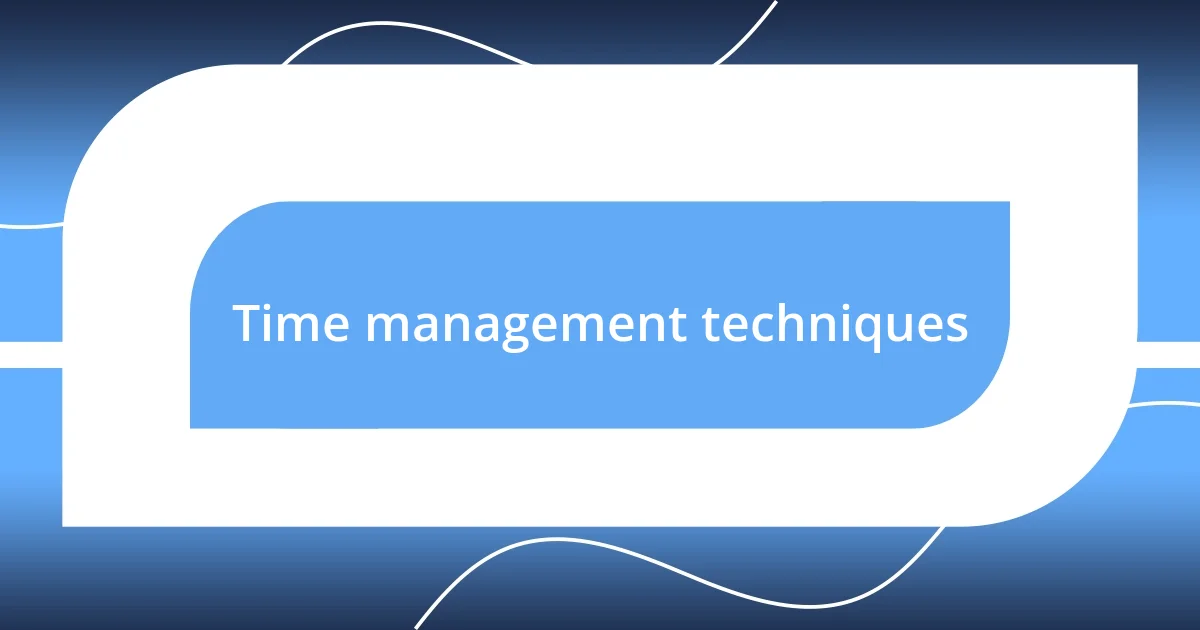
Time management techniques
Time management techniques
Effective time management is something that evolved in my journey as a developer. I recall those frantic days trying to juggle multiple projects, often leading to burnout. After experimenting with various techniques, I found that breaking tasks into smaller chunks made a significant difference. This approach not only makes daunting projects feel manageable but also provides a sense of achievement with each completed task. I now set specific time blocks for focused work, which allows me to dive deep into the problem at hand without distractions.
Here are some time management techniques that have greatly helped me:
– Pomodoro Technique: Working in 25-minute intervals followed by short breaks rejuvenates my focus.
– Time Blocking: Allocating specific hours for different tasks keeps me organized and ensures I dedicate time to each project.
– Prioritization Matrix: I often use this tool to categorize tasks based on urgency and importance, helping me focus on what truly matters.
– Setting Deadlines: Even for tasks without strict timelines, I impose my own deadlines to instill urgency and maintain momentum.
– Reflective Journaling: Occasionally, I jot down what I accomplished each week. This not only provides a sense of closure but also helps me plan better for the next week.
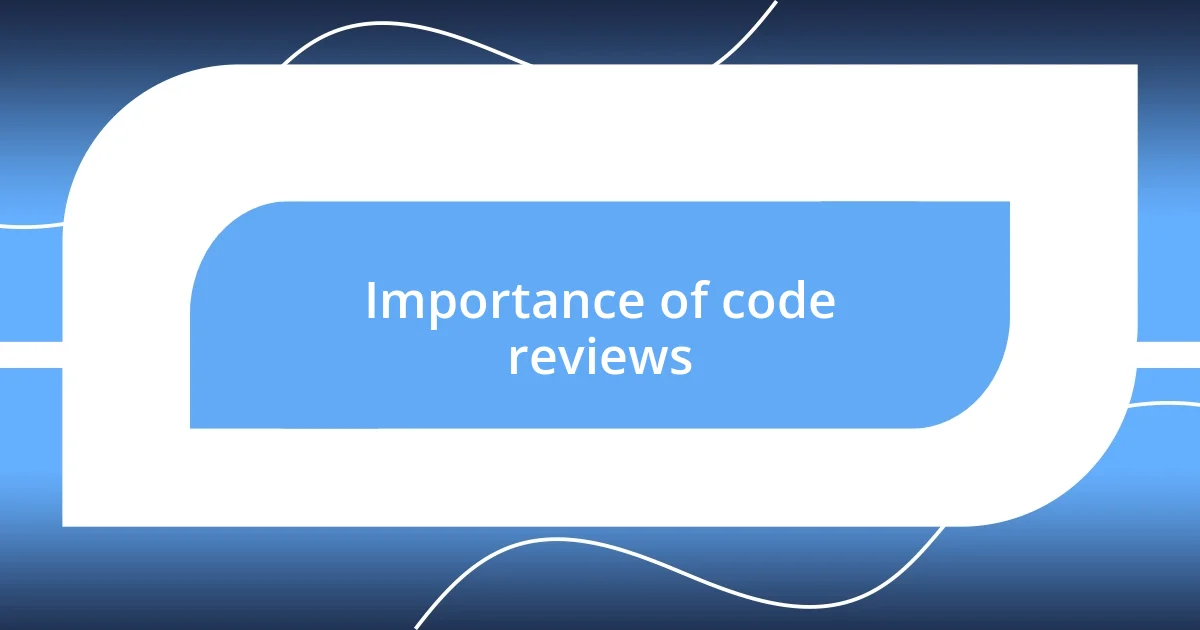
Importance of code reviews
I can’t emphasize enough how vital code reviews are in the development process. I recall a project where my colleague caught a significant oversight in my logic during a review. That small correction not only saved hours of debugging later on but also reinforced the value of having another set of eyes on the code. It’s amazing how collaboration can lead to improvements that are simply impossible to achieve alone.
Moreover, participating in code reviews fosters a culture of learning and knowledge sharing within a team. I’ve found that discussing different approaches and solutions brings out innovative ideas that can reshape a project entirely. It creates an environment where asking questions and suggesting changes feels safe and encouraged. I often think about how these moments of collaboration have shaped my skills in ways I never could have anticipated.
Lastly, code reviews serve as an excellent way to ensure code quality and maintainability over time. I remember feeling overwhelmed by the complexity of legacy code. After a thorough review process, we broke down those intricacies into more manageable parts, making future changes significantly easier. I’ve learned that good reviews lead to clean, well-structured code that stands the test of time, bringing both efficiency and clarity to the development process.
| Benefits of Code Reviews | Impact on Development |
|---|---|
| Improved Code Quality | Reduces bugs and enhances reliability |
| Knowledge Sharing | Encourages team collaboration and growth |
| Consistency in Codebase | Maintains standards and best practices |
| Fosters a Learning Culture | Promotes continuous improvement among developers |
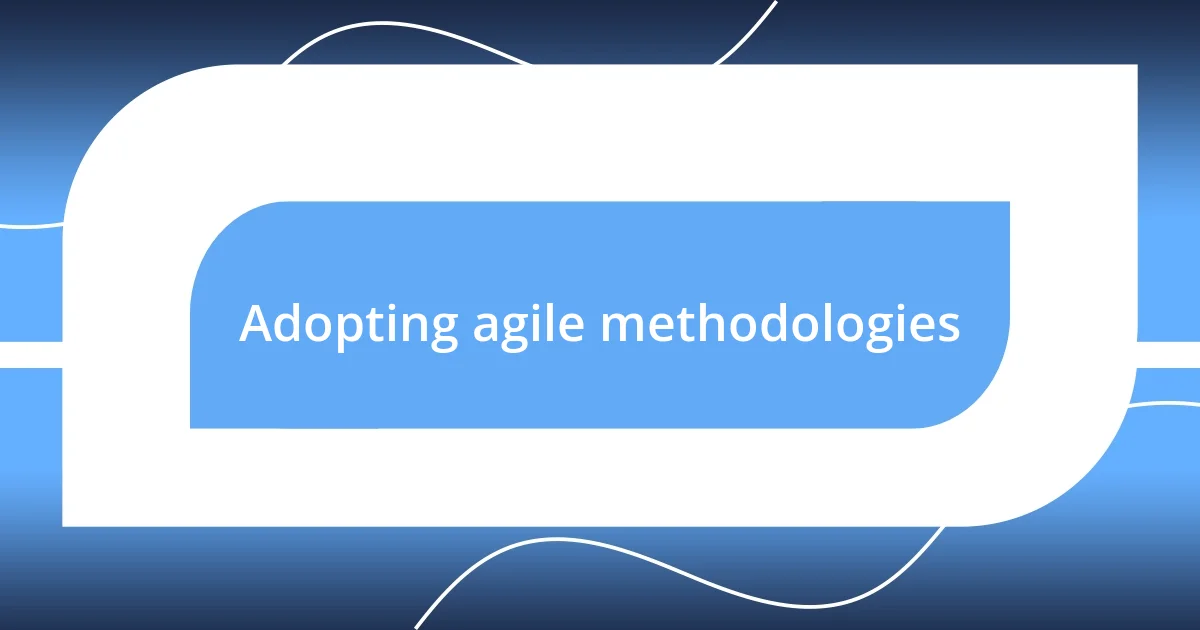
Adopting agile methodologies
Adopting agile methodologies has transformed the way I approach software development. I remember my initial hesitation; switching from a traditional waterfall model felt daunting. However, once I embraced the iterative cycles of agile, I found that breaking projects into smaller, manageable increments not only improved our delivery times but also substantially increased team morale. Isn’t it exhilarating to witness progress at the end of each sprint?
One of the practices that stand out for me is the daily stand-up meetings. At first, I thought they were just another obligation, but I’ve come to appreciate their effectiveness. Sharing updates and hurdles every morning has fostered a sense of accountability within the team. I can’t help but feel that these brief interactions provide a touchpoint that strengthens our collaboration. Have you ever noticed how a simple conversation can spark fresh ideas and problem-solving avenues?
Moreover, embracing agile means welcoming change. In a memorable project, we faced a significant shift in requirements just weeks before the launch. Instead of panicking, we utilized agile principles to adapt our plans swiftly. This flexibility allowed us to pivot without losing momentum. Reflecting on that experience, I realize that this proactive approach not only mitigated stress but also empowered us to deliver a product that truly resonated with our users. It makes me wonder: How often do we miss out on such opportunities when clinging to rigid plans?
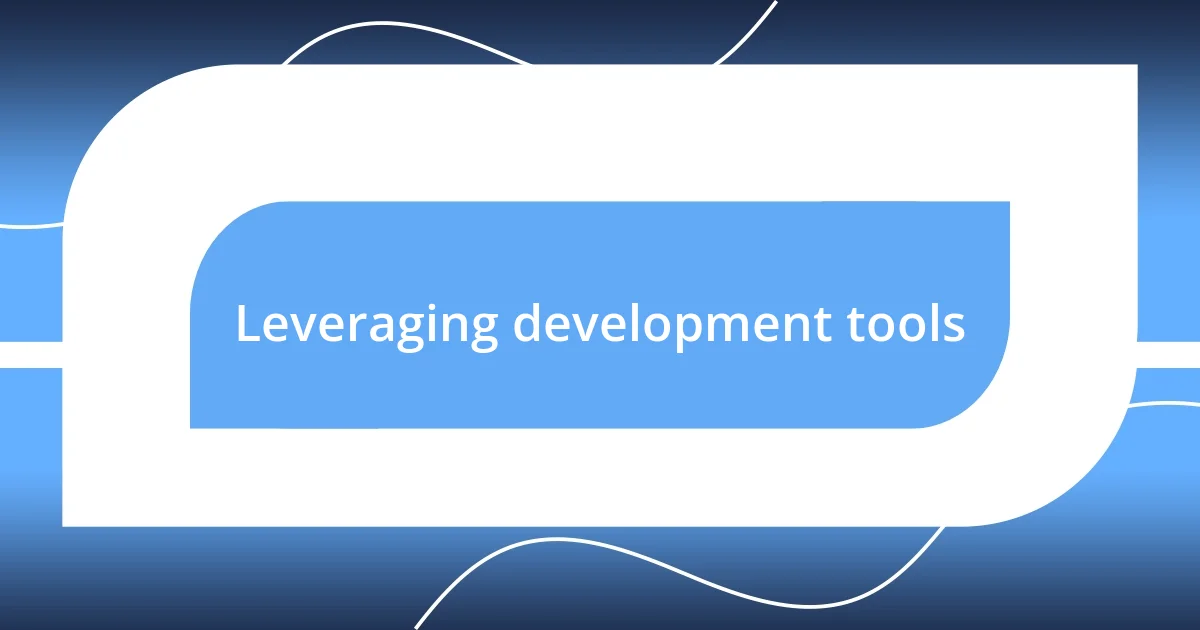
Leveraging development tools
Leveraging development tools has been a game-changer for my projects. I vividly remember when I began using version control systems like Git; the change in my workflow was remarkable. Not only could I track changes effortlessly, but the ability to roll back to previous versions saved me more than a few late-night debugging sessions. Have you ever experienced that sinking feeling when you realize you’ve overwritten a crucial piece of code? With these tools, that fear has diminished.
Additionally, integrating continuous integration and deployment (CI/CD) tools has streamlined my development process significantly. I recall working on a project where the automated builds highlighted errors in real-time, allowing the team to address concerns as they arose. It felt like having a safety net that ensured we never delivered broken code. How comforting it is to know that our code is tested thoroughly before it reaches the users!
Finally, utilizing project management tools like Jira or Trello has transformed how I organize tasks. I can’t stress enough how much clarity they bring to my day-to-day activities. In one instance, I was managing multiple deadlines across various teams, and having everything laid out visually was a lifesaver. I began to prioritize tasks more effectively and even found time for brainstorming sessions with the team. Doesn’t it feel great when you can keep track of everything while still having room for creativity?
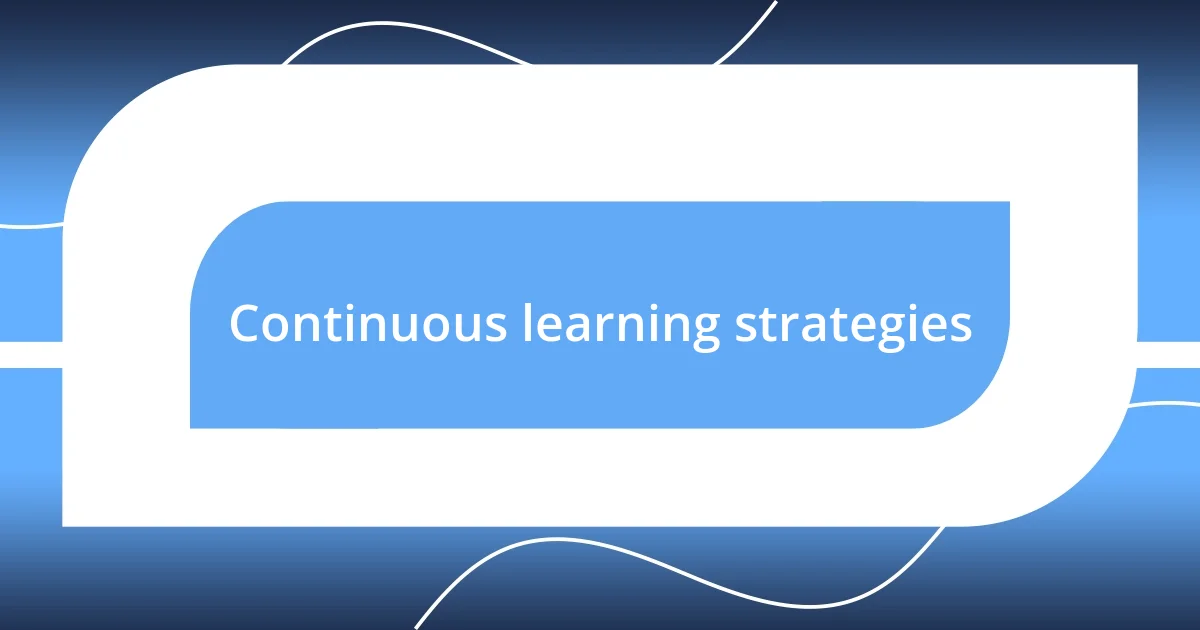
Continuous learning strategies
Continuous learning strategies are essential in the ever-evolving world of software development. One approach that has worked wonders for me is setting aside dedicated time each week for skill enhancement. I remember when I committed to this practice; I chose topics that intrigued me, like advanced algorithms or new frameworks. The excitement of diving into these subjects felt like being a kid in a candy store—each new concept opened up endless possibilities. Have you ever noticed how consistent learning can spark unexpected ideas in your projects?
I also find that engaging with online communities, such as coding forums and social media groups, has enriched my learning experience. Sharing my challenges and exchanging knowledge with fellow developers has been invaluable. Recently, I posed a question about optimizing a particular piece of code and was greeted with an array of responses that broadened my perspective. Who would have thought that one simple query could unlock so much insight? It reminds me how vital it is to tap into the collective expertise of our peers.
Lastly, attending workshops and tech meetups has played a significant role in my continuous learning journey. One particular workshop I attended not only provided me with hands-on experience in machine learning but also led to networking with incredible individuals in the industry. That connection resulted in collaboration on a project that I didn’t think was possible before. Isn’t it fascinating how personal interactions can catalyze growth in your career? Continuous learning, for me, is not just about individual growth; it’s about nurturing relationships that enrich our professional lives.
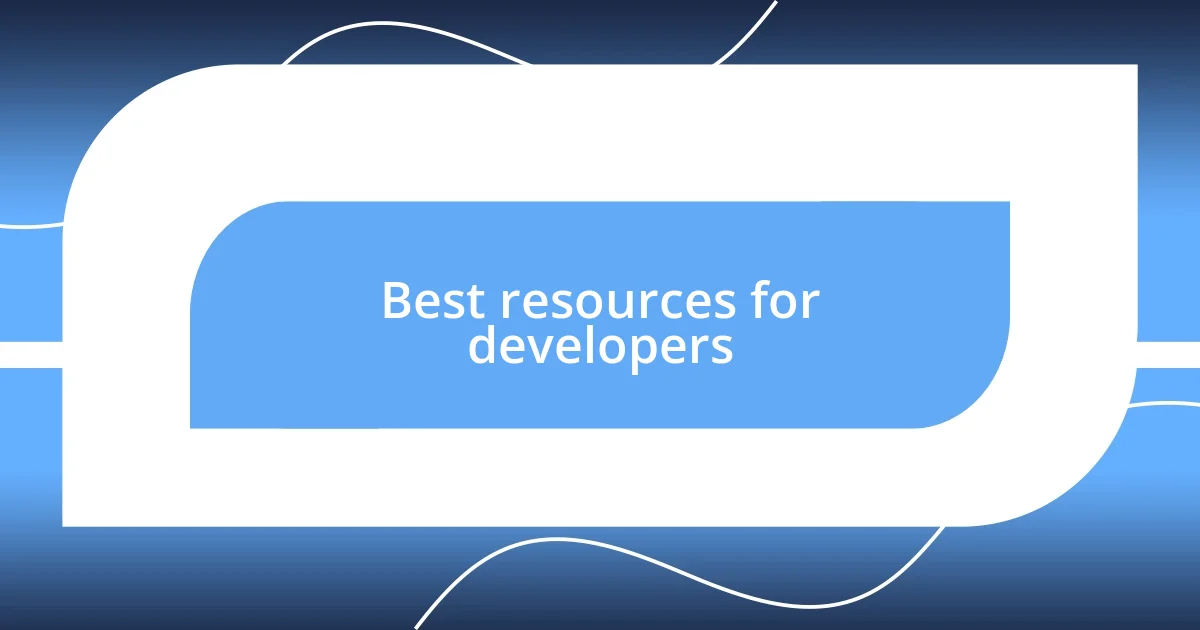
Best resources for developers
I have found that online platforms like Codecademy and freeCodeCamp are fantastic resources for both beginners and seasoned developers. I’ll never forget the sense of accomplishment I felt when I built my first project through their guided lessons. Did you ever have that “aha!” moment while coding? Those platforms make it easy to revisit core concepts at your own pace, which has been essential for solidifying my understanding.
Additionally, I’ve often turned to documentation as my go-to resource. Whether it’s reading through the extensive libraries of React or diving into the intricacies of Node.js, I’ve learned firsthand how important it is to become comfortable with official docs. There was a time when I felt overwhelmed by the sheer volume of information out there, but once I mastered skimming for the essentials, everything started to click. Have you ever struggled to find the answers in a sea of content? Understanding how to effectively navigate documentation truly empowers you as a developer.
Another invaluable resource has been tech podcasts and YouTube channels. I remember listening to a podcast episode while commuting that introduced me to a new debugging technique, which I promptly implemented that same evening. It’s incredible how a few insights from experts in the field can dramatically shift your approach to problem-solving. Does anyone else feel energized when you learn something that you can apply right away? Engaging with different formats like podcasts keeps my learning dynamic and exciting, helping me stay updated without feeling drained.












